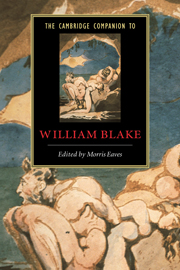Book contents
- Frontmatter
- 1 Introduction
- Part I Perspectives
- Part II Blake's works
- 10 Blake's early works
- 11 From America to The Four Zoas
- 12 Milton and its contexts
- 13 Jerusalem and Blake's final works
- A glossary of terms, names and concepts in Blake
- Guide to further reading
- Seeing Blake's art in person
- Index
- Series List
12 - Milton and its contexts
from Part II - Blake's works
Published online by Cambridge University Press: 28 May 2006
- Frontmatter
- 1 Introduction
- Part I Perspectives
- Part II Blake's works
- 10 Blake's early works
- 11 From America to The Four Zoas
- 12 Milton and its contexts
- 13 Jerusalem and Blake's final works
- A glossary of terms, names and concepts in Blake
- Guide to further reading
- Seeing Blake's art in person
- Index
- Series List
Summary
The best way into the time-twisting, identity-scrambling otherworld of Blake's Milton: A Poem (c. 1804-18) is to set aside guidebooks, including this one, take a deep breath, and follow the hero as he breaks through the surface of the title page - alone, without a “companion” - parting the syllables of his own name (and the poem's title) with one hand, sweeping back publishing details with the other, to brave the swirling abyss of the unknown (Fig. 31). The reader-resistant text billowing around Milton's nude figure scans vertically, bottom to top on the left, top to bottom on the right - a hint of the head-spinning reorientations to come. At the foot of the page, in much smaller lettering, a single upright line appears reassuringly straightforward: “To Justify the Ways of God to Men” (Paradise Lost 1:26). But is Blake reaffirming - or co-opting - Milton's magisterial summation of epic purpose? Or is Milton, in flexing his left foot to take a second step into Blake's poem, leaving the secure foundation of his theodicy behind him? Should both poets - and their audiences - be interrogating, not justifying, God's ways? As the poem proceeds, readers find themselves clueless in medias res, thrown back on their own resources, as if subjected to a wilderness-survival test. But the neural overload helps cleanse the doors of perception, and the solo ordeal can be character-building. This chapter is meant to be put aside now and taken up again on the far side of “Finis” (Milton 43 [50]:2, E 144), after pulse and respiration have returned to normal.
- Type
- Chapter
- Information
- The Cambridge Companion to William Blake , pp. 231 - 250Publisher: Cambridge University PressPrint publication year: 2003
- 4
- Cited by



